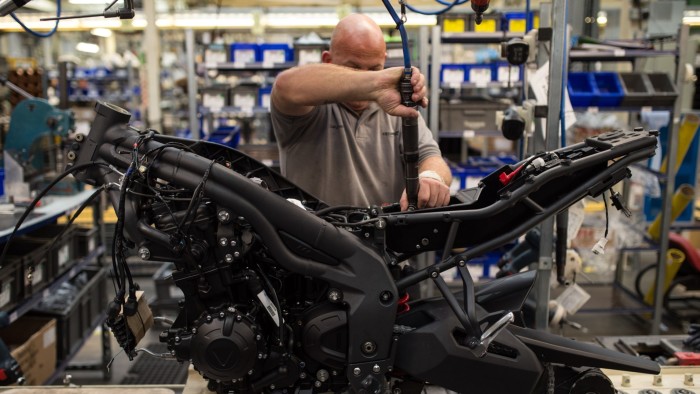This article is an on-site version of our FirstFT newsletter. Subscribers can sign up to our Asia, Europe/Africa or Americas edition to get the newsletter delivered every weekday morning. Explore all of our newsletters here
Today’s agenda: Why Olaf Scholz hopes to lose a confidence vote; Revolut backers offload $1bn of stock; mental health crisis hits workplaces; how the ‘mother of all bubbles’ will pop; and a walk through Edinburgh
Good morning. We start the week with news from the UK, where confidence in the economy among manufacturers has fallen at the sharpest rate since the start of the Covid-19 pandemic after Rachel Reeves’ tax-raising Budget.
What the data shows: Manufacturers’ confidence fell to 5.8 in the final quarter from 6.8, the largest quarter-on-quarter drop since the spring of 2020, according to a survey by trade group Make UK and business advisory firm BDO. The survey ranks views of economic conditions in the year ahead on a scale of 1 to 10.
Why it matters: The figures add to evidence that the Labour government’s £25bn increase in employer national insurance contributions has hit business morale just as the UK economy shows signs of slowing. Reeves suffered a blow last week when official data showed the economy shrank by 0.1 per cent in October, the second monthly contraction in a row. The data also complicates the picture for the Bank of England ahead of its monetary policy announcement on Thursday. Read the full story.
-
No Spring Budget: Rachel Reeves will not hold an emergency tax-raising Budget despite fears of a fiscal rule breach, the Treasury has insisted.
-
UK market exodus: The London Stock Exchange is on course for its worst year for departures since the global financial crisis despite efforts to boost the City’s attractiveness.
For more on UK economy, trade and investment, sign up for The State of Britain newsletter here if you’re a premium subscriber, or upgrade your subscription here.
Here’s what else we’re keeping tabs on today:
-
Economic data: The EU, France, Germany, the UK and the US have flash manufacturing and services purchasing managers’ indices. Rightmove releases its UK house price index for December.
-
German politics: Chancellor Olaf Scholz is expected to lose a confidence vote in parliament, a defeat the German leader is counting on to trigger early elections.
-
Companies: Vivendi’s newly spun-off entities Canal+, Havas and Louis Hachette Group start trading in London, Amsterdam and Paris, respectively. Clothing group OVS reports third-quarter results.
Five more top stories
1. The Federal Reserve is set to take a more cautious approach to interest rate cuts on fears that Donald Trump’s policies will stoke higher inflation, according to academic economists polled by the Financial Times. Respondents to the FT-Chicago Booth survey moved up their forecasts for the federal funds rate next year compared with the previous poll in September. Here’s where they see rates by the end of 2025.
2. Exclusive: Bashar al-Assad’s central bank airlifted about $250mn in cash to Moscow in a two-year period, corporate records analysed by the FT show. The unusual transfers underscore how Russia became one of the most important destinations for Syria’s cash as western sanctions pushed it out of the financial system. Read the full investigation.
-
Retreat from Syria: Russia has evacuated at least 400 soldiers from Damascus, pointing to early signs of co-operation between Moscow and Hayat Tahrir al-Sham.
3. EU officials are pushing for new powers to combat the threat of Chinese imports as Brussels fears divisions between member states will hamper its ability to fight back in a global trade war. With the US and China able to impose tariffs and subsidies almost instantaneously, EU policymakers are worried that the traditional trade measures it has at its disposal would be too slow to deploy.
4. Exclusive: Revolut staff and early investors have offloaded almost $1bn of stock since August after the fintech’s UK banking licence galvanised support from big financial institutions, including Abu Dhabi sovereign investor Mubadala. Read more about the so-called secondary share sales.
5. The Creative Rights in AI Coalition has urged the government to protect copyright rules of the more than £100bn-a-year industry ahead of a controversial consultation, saying a licensing market for the use of creative content in building generative AI is needed not just for fairness, but is also “the only way that both sectors will flourish and grow”.
Visual story
Over the past few years, Chinese companies have established themselves deeper into supply chains in Mexico, developing stronger trade links and increasing manufacturing. While president-elect Donald Trump has threatened Mexico’s government with tariffs, China is setting up shop in America’s backyard, causing concern among trade officials in the US and Canada.
We’re also reading . . .
-
Trump’s industrial policy: A new bipartisan bill to be introduced this week raises questions about which faction of the incoming administration — Maga or Wall Street — is steering the ship.
-
‘Stay in your lane’: Tony’s Chocolonely chief Douglas Lamont insists he doesn’t have to have a view on “every single political event going on around the world”.
-
‘The mother of all bubbles’: All the enthusiasm about “American exceptionalism” only tends to confirm that the bubble is at a very advanced stage, writes Ruchir Sharma.
Chart of the day
A mental health pandemic is engulfing the world’s workplaces, with financial services among the hardest-hit sectors. With depression and anxiety costing the global economy $1tn annually, Clive Cookson and Amy Borrett explore how employers and governments are tackling the crisis in this first instalment of the Global Crisis in Mental Health series.
Take a break from the news
Edinburgh is not just the capital of Scotland, it is also the capital of the “Caledonian Antisyzygy”: the idea that the presence of duelling polarities is a defining characteristic of the Scottish temperament. From castle to cathedral to a Canongate oyster bar, Mure Dickie goes on a walkable route that uncovers the light and dark of the city’s history.

Thank you for reading and remember you can add FirstFT to myFT. You can also elect to receive a FirstFT push notification every morning on the app. Send your recommendations and feedback to firstft@ft.com
Source link










